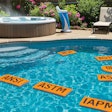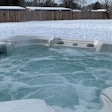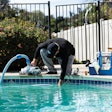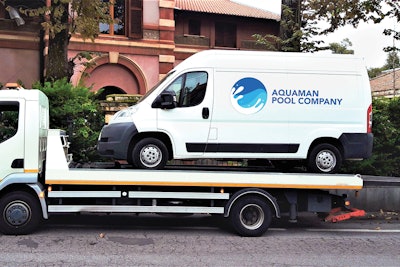
The pool industry has been around for a long time, and just like any other industry, change is inevitable. I hate that sentence; it sounds like the beginning of every "Suck it up, Buttercup" pep talk given to a malcontent unhappy with something new since the beginning of time. But let me explain.
Our chosen trade has experienced various changes over the last century, and in some cases, they have gone as far as to threaten the livelihood of the pool service professional. So, when asked to deliver the Keynote at last year's World Aquatic Health Conference (WAHC), the topic — especially post-pandemic — seemed like a no-brainer: the change we've seen over the years in the pool industry. Besides, it allowed me to point out successes and address looming transformations. However, you need to understand that I have no interest in jumping on the evolution train, waving a white flag, or screaming, "Adapt!" at the passengers I manage to coax onboard.
The misconception is that change requires you to change — to be someone other than yourself. That's what they tell you, "Hey, you need to change." That advice/instruction only makes people want to whack themselves in the head with a telepole. Words like "comply" or "evolve" sound like someone, or something, is attempting to take something away from you.
Listen, when everything gets upended, it's not easy or smooth; it's like riding your car down a Jersey sidewalk. We shouldn't be delusional and think we can make it effortless or uneventful. But no matter how bumpy the ride, as long as you don't lose any of that you-ness that makes you who you are, we should be okay.
So when the next big wave hits, clutch your fists around that chutzpah you have going on as if your life depended on it — because it does. It's your life-preserver. Then, recognize the change, give it the finger, and take control of it. That's how an industry faces a forced transformation and comes out the other end as something you still want to be a part of.
Forgive me — I get passionate. But when the shmutz hits the fan, I am adamant that it's the expertise and character of the people in the field that will get us through it. In that spirit, let's explore a few of the changes the pool industry has undergone — including some new product announcements from past years and some things "they" said would put us OUT OF BUSINESS.
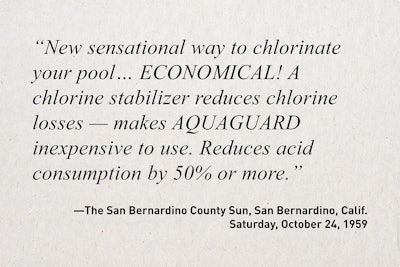
1960s - 1980s
One of the most significant changes the pool industry has experienced is the rise of mail-order companies. The first major player in this space was a husband-and-wife team taking orders and shipping products from their garage. Sound familiar? This is a trend we will see repeatedly.
These companies began selling chemicals and equipment directly to the end user, offering lower prices than traditional pool companies. This change caused alarm in the industry, and many believed that mail-order companies would put traditional pool service companies and retailers out of business.
This did not happen. Despite the low prices offered by mail-order companies, many homeowners still preferred traditional pool service companies. This is because pool service companies provide a level of expertise and personalized service that mail-order companies could not match. Additionally, homeowners who used mail-order companies had to handle their pool maintenance themselves, which they discovered could be difficult and time-consuming.
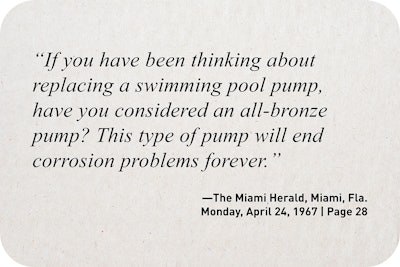
1990s
The brick-and-mortar retail giant that dominates here was established in the early 1960s by two friends who partnered and began selling directly to consumers... wait for it... from their garage. Their reach expanded at a moderate rate throughout the rest of that decade and into the next two. It wasn't until the 90s that this retail giant began to grow rapidly and nationwide. As they expanded, so did their buying power, as well as their ability to purchase manufacturer-direct — just like the mail-order companies we spoke of before.
The deep discounts they received were reflected on the sticker price. This was the hit that would put us all out of business. How do we compete with that? The short answer: We don't. We make them compete with us. And that is precisely what we did. I'm not going to lie — we lost some great mom and pops along the way, but service, it turned out, was far from dead. The level of customer service we could offer in a customer's backyard, the convenience factor, and the level of expertise, was unsurpassable.
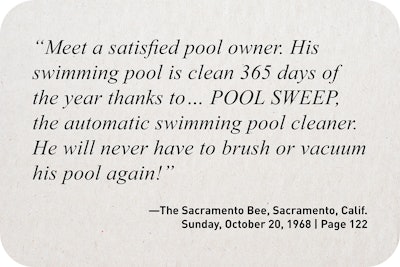
2000s
Lowe's started as a general store in 1921, but they weren't the first in the mega-merchant space; that title belongs to Home Depot, which opened at 60,000 square feet of retail space right out of the gate. This wasn't a problem for us because they didn't have pool stuff — that is, until the aughts. When customers started mentioning the product ads they'd seen from HD, the pool pros felt the pressure. But again, knowledge prevailed. Don't believe me? Next time you're in there, ask any of the orange vests how to use one of their pool chemicals.
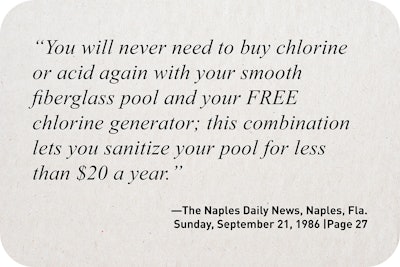
2010s
The rise of e-commerce also posed a threat to the pool industry. E-commerce platforms, like Amazon, made it even easier for homeowners to buy pool chemicals and equipment without leaving home.
Again, you have people selling stuff out of garages (or warehouses) at significantly reduced prices. And again, this shift threatened the existence of traditional pool service companies — as homeowners could now easily buy the products they needed and perform pool maintenance themselves (with a bit of help from YouTube). This was a big problem. Anyone could now directly sell pool products coast to coast from their garage. YouTube (created in 2005 by three tech guys in their garage) was another concern with the free DIY instruction in video format. Our knowledge is part of our value, and that experience level is accounted for in our rates (if it's not, you're selling yourself out). Luckily, even though several very knowledgeable individuals on the platform share spot-on instruction, the majority of how-to pool videos are created by morons.
How did we compete with the internet? Again, we didn't. We made the internet compete with us. Turned out, again, that they can't do what we do: Providing personalized service, a superior level of technical acumen, and a doctor-patient relationship with the pool is what traditional pool service companies are known for.
Don't forget you are also a quasi-chemist of sorts. Here, try this: Tell the customer to ask the internet when they can come out and warranty that pump with the leaking seal they bought and DIY installed last month. Okay, not really, but...
As in every challenge previously discussed, pool service professionals stood strong during the forecast events without rolling over and showing their bellies. We're still here, 30 years after Jeff Bezos started Amazon — in his garage.
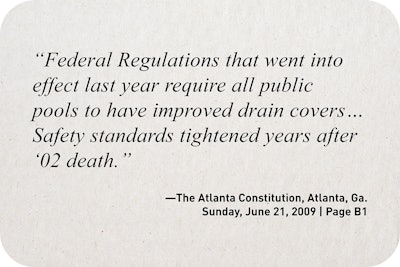
2020s
The COVID-19 pandemic has brought about significant changes in many industries, and the pool industry is no exception. Initially, the government shut us all down with quarantine. Then, some states deemed us as essential, while others did not.
Several of us took it upon ourselves to contact legislators to demand this be changed — even calling states that were not our own. Myself and Dan Lenz (All Seasons Pools, Chicago, Ill.) had the banning of pool service and construction overturned in three states and two counties in entirely different states. When masks were in short supply, and we were not permitted to work without them, we hired people to sew them and shared them with other pool professionals at no charge. I sent out roughly 1,000 masks to pool service techs nationwide myself.
Supply chain disruptions and increased demand have skyrocketed the cost of pool equipment and chemicals. These price increases led many to believe that traditional pool service companies would be put out of business, as homeowners can no longer afford their services if they raise their rates to offset costs.
The pool industry has, once again, shaped the changing landscape, and — despite the constant shortages and price hikes — we are flourishing. That, my friend, is because of you, the pool professional. No matter what was thrown at us, we found a way. That's not "adapting." That's taking control of the situation — because that's what we do.
This article first appeared in the May 2023 issue of AQUA Magazine — the top resource for retailers, builders and service pros in the pool and spa industry. Subscriptions to the print magazine are free to all industry professionals. Click here to subscribe.







































